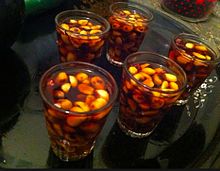Arabic tea
 Two glasses of Arabic tea | |
| Alternative names | šāy ʿarabiyy |
|---|---|
| Type | Tea |
| Course | Drink |
| Place of origin | Arab world |
| Region or state | Arab World |
| Associated cuisine | Arab cuisine |
| Serving temperature | Hot |

Arabic tea (
Arab society
Tea is an important drink in the Arab world and is usually served with breakfast, after lunch, and with dinner. For Arabs, tea denotes hospitality, and is typically served to guests. Tea owes its popularity to its social nature; it is one of the most important aspects of hospitality and business etiquette in Arab culture. Importantly, one should not reject tea when offered, because it may be considered rude.
Varieties
There are many different types of Arabic tea:



- Arabic: هال, romanized: hāl) tea is very common in the Arab world, and is known for its strong aroma. It is sometimes mixed with coffee, and is said to help digestion and increase saliva flow. It is drunk before meals to prepare digestive enzymes. Although one of the most expensive spices in the world, cardamom is still largely harvested by hand for many Arab customers.
- Arabic: الشاي, romanized: aš-šāy; Maghrebi Arabic: التاي at-tāy) is a green tea prepared with spearmint leaves and sugar, traditional to the Maghreb region (the northwest African countries of Morocco, Algeria, Tunisia, Libya, and Mauritania). The tea originally arrived thanks to English traders and has spread in popularity throughout Africa, France, and other neighboring countries. Known for its flavor and vitality, the fresh mint used to prepare at-tāy helps to clear the palate after meals.[7]
- Arabic: شاي بالنعناع, romanized: šāy bi-l-naʿnāʿ) is commonly used to get over colds, a sore throat, sinus congestion, and stomach ulcers. Seasonal allergies can also be treated by drinking cups of tea containing rosmarinic acid: an anti-inflammatory agent found in mint.
- Arabic: كركديه, romanized: karkadayya) tea is drunk hot in the winter and cold in the summer. Hibiscus teahas a large amount of vitamin C.
- Arabic: شاي بالقرفة, romanized: šāy bi-l-qirfah) is created by putting water in a boiler together with cinnamon sticks and sugar. Cinnamon tea contains many health benefits such as bacterial resistance, diabetes treatment, protection against heart disease, and prevention of colon disorders, as well as containing many antioxidant compounds.[9]
- Arabic: شاي لومي, romanized: šāy lūmiyy) also known as chai noomi basra, noomi basra tea or loomi tea, is a type of herbal tea made from dried limes that is traditional to Iraq, Kuwait, Oman and United Arab Emirates.
Served
Tea in the Arab world is usually a strong dark mix, similar to the so-called "breakfast tea" served in other parts of the world. Often brewed with sugar and served in long glasses, it can also be made with mint or cardamom, or with a dash of milk. In Yemen, black tea is brewed in water and milk.[10]
See also
References
- ^ "Syrian Drinks - Syrian Tea - Arab Culture and Hospitality -". The Official Globe Trekker Website. Retrieved 2017-04-07.
- ^ "Arabian Tea". prezi.com. Retrieved 2017-04-07.
- ^ "Maramia- Sage Tea | Rooted In Salt". Rooted In Salt. 31 July 2014.
- ^ "Chai Babooneh - Chamomile Tea". turmericsaffron.blogspot.ch. 25 November 2012.
- ^ "Anise Tea (Yansoon) - Taste of Beirut". Taste of Beirut. 24 October 2009.
- ^ "11 Promising Benefits of Za'atar | Organic Facts". www.organicfacts.net. 2 February 2016.
- ^ "The Art of Moroccan Mint Tea and How to Brew It". Organic Authority. Retrieved 2016-10-21.
- ^ "Syrian Drinks - Syrian Tea - Arab Culture and Hospitality -". The Official Globe Trekker Website. 24 January 2022.
- ^ "9 Benefits of Cinnamon". Benefits (in Arabic). 16 March 2019.
- ^ Yemeni Tea. shebayemenifood.com. 05.30.2012.
